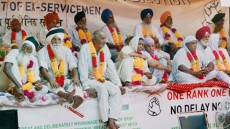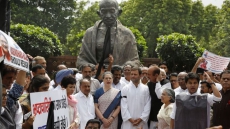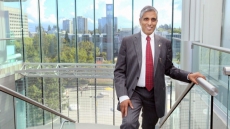The extension of Sonia Gandhi's term as Congress president by another year in her 17th year in the position is an admission of the party's failure to be a living, evolving, dynamic entity rather than an acknowledgement of her staying power and acceptability within the organization.
Any political party in a democracy which adopts the norms of authoritarian regimes where leaders generally have life-long tenures merely exposes the pathetic paucity of talent within the outfit.
In the Congress's case, the resemblance with, say, a dictatorship like North Korea is strengthened by the fact that both the present leader and the already designated successor belong to the same family. The obsequious kowtowing to the two by Congressmen is also not dissimilar to the meek submissiveness to the powers-that-be which characterizes totalitarian establishments.
However, in addition to these unflattering similarities, there is another aspect of the Congress Working Committee decision on Sonia Gandhi which reflects poorly on the prospects of her son, the heir-apparent, Rahul Gandhi. It is that he has obviously been found wanting in the internal assessments which preceded the move to enable his mother to continue as party chief.
From this aspect, the fact that the crown prince remains where he was can be regarded as a blow to his prestige. Evidently, the 57-day sabbatical in a Buddhist monastery in Myanmar which was apparently expected to prepare him for greater responsibilities has not yielded the desired results.
That even a party which apparently looks upon the Nehru-Gandhis as demi-gods found someone with feet of clay in the family pantheon suggests that the formerly Grand Old Party hasn't yet lost all sense of judgment, even if it cannot get rid of its feudal mindset.

For Sonia Gandhi, however, the latest crown of thorns can prove to be more prickly than ever. For one, she is evidently not in the pink of health. If she has, nevertheless, accepted the onerous responsibility at a time when the Congress itself is not very healthy in political terms, it is probably because of the "after me, the deluge" syndrome which makes her unsure about the party's future in her absence. Her anxieties are apparently shared by a wide cross-section within the party.
For another, she cannot but harbour a sense of disappointment because her cherished hope of grooming her son as the successor hasn't yet borne fruit. Nor is there any surety that it will at the end of her extended run as the party chief next year.
Therefore, the question which bothered the observers of the political scene in the 1960s - after Nehru, who ? - has returned to haunt the Congress today.
It is also undeniable that Rahul Gandhi himself cannot but secretly share some of his mother's disappointment. For all the praise that she showered on him for having forced the government to backtrack on the land acquisition law, the dauphin knows that he hasn't been able to live up to expectations. Given this failure, it cannot be easy for him from now on to make his presence felt at party meetings.
As long as it was believed that it was only a question of time before he donned the party president's mantle with his mother continuing as the eminence grise (grey eminence), Rahul would have commanded attention at party conclaves and even public meetings. But, now, it appears that he will not be the chief any time soon.
There is little doubt that the delay in his coronation will once again raise the question within the party of persuading an otherwise reluctant Priyanka Gandhi-Vadra to play a greater role, for a not inconsiderable section in the Congress believes that she is the answer to the party's leadership problems.
But Rahul Gandhi apparently resents these insinuations which is why she has chosen to remain in the background. Besides, her husband's controversial business deals are a liability.
What these developments, personal and organizational, suggest is that the Congress is approaching a fork in the road. The dynasty, which has been its mainstay, appears to be nearing the end of its run. It may remain formally in charge for some time, but its aura is fading.
Its diminishing influence will suffer a further erosion if the party doesn't fare well in the Bihar elections and later on in Assam, West Bengal, Kerala and Tamil Nadu. In any event, it is clear that the days of the Congress's nationwide dominance are over.

The party will have to brace itself, therefore, for a new leadership. In the 1960s, Lal Bahadur Shastri was the answer to the question: After Nehru, who ? There is no one on the horizon at present who can play such a role.
Arguably, the fault for this absence of an alternate line of leaders has to be laid at Sonia Gandhi's door. During her 17 years as president - the longest in the history of the 130-year-old Congress - she was too focussed on her son's elevation to prepare others for the job.
What is more, others with some stature in the organization - Manmohan Singh, Pranab Mukherjee (before he became the president), P. Chidambaram, Digvijay Singh - lacked the gumption to tell the party president about selecting others.
Now, mother and son will have to plough a lonely furrow in a darkening political landscape for the Congress.



